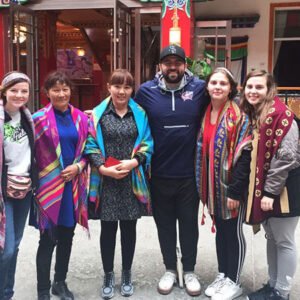Hebei Medical University (abbreviated as HMU), formerly known as the Beiyang Medical School, is one of the high ranking universities in Hebei Province. Founded by the Governor Li Hongzhang in Tianjin in 1894, Hebei Medical University was the very first western medical school established by the government. One year after the Revolution of 1911, in October of 1912, the government of the Republic of China issued the No.16 and No. 25 order, which changed the university’s name from Beiyang Medical School to Zhili Public Medical College. and the College began to enroll undergraduates in the same year. Three years later, the college moved from Tianjin to Baoding in 1915. On July 7th 1937, with the outburst of the full-scale invasion from Japan, China became the main battlefield of the Second World War in East Asia. The College was forced to be closed due to the war. The College re-opened and re-admitted students again in January 1946. In April 1949, the college was renamed Hebei Medical College. In 1958, the college moved from Baoding to Shijiazhuang. In 1995, Hebei Medical College, Hebei College of Traditional Chinese Medicine and Junior Medical College of Shijiazhuang merged into one school, which was named Hebei Medical University. In 2013, Hebei College of Traditional Chinese Medicine became an stand-alone institution again. In 2016, HMU got endorsed by the Ministry of Education, National Health and Family Planning Commission, and Hebei Province for joint support. During the 13th 5-Year Plan period, HMU set the goal as “To become a high-level medical university with a distinctive feature”.
In the past 120 years and especially through over 30 years of development after China’s reform and opening up to the outside world, adhering to the tradition “respect virtues and profession, and be rigorous and creative”, Hebei Medical University has become a comprehensive medical university, encompassing teaching, research and healthcare services. In 2005, HMU came up with the new motto “Benevolence, Erudition, Integrity, and Flexibility”. In 2015, Student centered, teacher first’ was also set as the university’s educational rationale. Up to now, HMU has two campuses, and five affiliated hospitals, with 14 colleges and 18 undergraduate majors. There are four national-level characteristic courses and four provincial-level characteristic courses. The total number of enrolled students at HMU is currently 11807.
HMU has four post-doctoral programs covering Basic Medical Sciences, Clinical Medicine, Integration of TCM and Western Medicine, and Biology. It has 37 doctoral programs and 52 masters programs. There is a complete medical education system covering the training of bachelors, masters, PhD and post-doctors. Hebei Province was formerly known as Zhili Province during the Republic of China era.
There are over 15000 teaching and administrative staffs. In terms of teaching staffs there are 1005 professors, 1537 associate professors, 117 doctoral supervisors, and 1414 masters’ supervisors. Among the academic staffs, there are some well learned professors who enjoy good reputation both at home and abroad, including three academicians of Chinese Academy of Engineering, one outstanding national professional talent, one renowned teacher of the national Ten Thousand Talent Plan, eight Outstanding National Model Teachers, one member of the Thousand Youth Plan, four members of Thousands of Talent Project, two outstanding Yanzhao Scholars, four High-End Talents and 11 Outstanding Teachers of Hebei Province. In addition, there are 126 experts who enjoy the special allowance of the State Council, 60 outstanding provincial experts, and 112 young and middle-aged experts with outstanding contributions.
HMU has five directly affiliated hospitals, with 9139 beds, including four Tertiary A grade general hospitals, and one Tertiary A grade specialty hospitals. In addition, there are 5 indirectly affiliated hospitals, five teaching hospitals and 28 sites for clinical practice.
HMU is not only the center for medical education and healthcare services, but also the center for medical research in Hebei Province. It has one national key discipline (Foundational Research on the Integration of TCM and Western Medicine), one national key nurturing discipline (Forensics), one national key discipline from the State Administration of Traditional Chinese Medicine (Foundational Research on the Integration of TCM and Western Medicine), 16 key national clinical specialties, one provincial key nurturing discipline, four provincial advanced characteristic disciplines, 12 provincial key disciplines, two key laboratories jointly supported by the province and the Ministry of Education, three provincial centers for collaborative innovation, one provincial new-type think-tank, one research center of philosophy and social sciences, two key research bases of humanities and social sciences of the Provincial Department of Education, 20 key provinciallaboratories and six provincial research institutes. In addition, HMU undertakes the editing and publishing of eight national and provincial journals.
In recent years, HMU has been strengthening its international exchanges and cooperation, which is an important platform for academic and cultural exchanges of Hebei Province. It has successively established close cooperative relationship with 27 medical schools and research institutes in 12 countries, such as Japan, South Korea, the United States, Belgium, and France. Over a hundred international experts have been conferred honorary titles of the university, and there are 446 international students on campus. In addition, the university adheres to the principle that it should serve the local community, and provide intellectual support to the local government and enterprises. HMU has successively signed 43 cooperative agreements with a number of enterprises and institutions, covering such aspects as education, research, and social services.
Hebei Medical University is a key backbone university in Hebei Province. It was first named Beiyang Medical School. It was founded in 1894 by Li Hongzhang, the governor of Zhili and Beiyang, in Tianjin. It is the first official western hospital in modern China. After the Revolution of 1911, in October 1912, the Ministry of Education issued the 16th Decree. Beiyang Medical School was renamed Zhili Public Medical College in 1913 and began to recruit undergraduates. The school was relocated to Baoding in 1915. The outbreak of the Anti-Japanese War on July 7, 1937 forced the school to be closed. Re-enrollment in January 1946. In April 1949, it was renamed Hebei Medical College. In 1958, the school was relocated from Baoding to Shijiazhuang. In 1995, the former Hebei Medical College, Hebei College of Traditional Chinese Medicine, and Shijiazhuang Medical College merged and renamed Hebei Medical University. In 2013, Hebei College of Traditional Chinese Medicine resumed its independent establishment. In 2016, the Ministry of Education, the National Health and Family Planning Commission, and the People's Government of Hebei Province formally signed an agreement to jointly build Hebei Medical University. During the "Thirteenth Five-Year Plan" period, the school formulated the development goal of "building a high-level medical university with distinctive characteristics.
Adhering to the excellent school spirit of “Chongde, Dedication, Prudence, and Innovation”, the school has become a comprehensive medical university integrating teaching, scientific research, and medical treatment after 125 years of development, especially the 40 years of reform and opening up. In 2005, the school put forward the school motto of “Mingde Learns and Fang Zhiyuan”. In 2015, the school established the "student-oriented teacher first" philosophy. At present, the school has two campuses and five directly affiliated hospitals, with 18 secondary colleges and 24 undergraduate majors, including 4 national specialty specialty and 4 provincial specialty specialty. There are 13,795 full-time students, including 3,418 doctoral and master students, and 413 international students.
The school has 4 post-doctoral research stations for basic medicine, clinical medicine, integration of traditional Chinese and western medicine, and biology, and has six first-level doctorates in basic medicine, clinical medicine, biology, public health and preventive medicine, pharmacy, and integration of traditional Chinese and western medicine. Degree granting power; 52 disciplines have the right to grant master's degrees, and have a complete medical education system to train bachelor, master, doctor and postdoctoral fellows.
The school system has a total of more than 15,000 faculty and staff (including the affiliated hospitals), of which 1,096 are professional and technical personnel at vocational and vocational level, 1,654 are professional and technical personnel at vocational level, 117 are doctoral supervisors, and 1,519 are master supervisors. Among this team are a group of knowledgeable experts and professors with high reputation at home and abroad, including 4 academicians of the Chinese Academy of Engineering, 1 national outstanding professional and technical talent, 1 "Ten thousand plan" teaching master, and the national multi-million talent project 4 candidates, 3 Yan Zhao scholars, 4 high-end talents in Hebei Province, 8 national outstanding (model) teachers, 11 teaching teachers in Hebei colleges and universities, 107 experts enjoying special allowances from the State Council, and 60 provincial excellent experts 111 outstanding young and middle-aged experts.
Of the school's 5 directly affiliated hospitals, 4 are tertiary first-class general hospitals, and one is a tertiary specialist hospital with 9,139 beds. In addition, there are 5 non-directly affiliated hospitals, 5 teaching hospitals and 28 internship bases, with 25,000 teaching beds.
The school is not only a medical education and medical treatment center in Hebei Province, but also a medical research center in Hebei Province. There are 1 national key discipline (Basics of Integrated Traditional Chinese and Western Medicine), 1 key cultivation discipline (Forensic Medicine), 1 key discipline of the State Administration of Traditional Chinese Medicine (Integrated Traditional Chinese and Western Medicine), 16 national clinical key specialties, Hebei Province There are 4 "double first-class" construction disciplines, 1 national key discipline cultivation project support discipline in Hebei Province, 4 strong distinctive disciplines in Hebei Province, 12 provincial key disciplines, and 2 provincial (Ministry of Education) key laboratories. 3 provincial collaborative innovation centers, 1 provincial new think tank, 1 provincial philosophy and social science research base, 2 provincial humanities and social science key research bases, 20 provincial key laboratories, research laboratories and engineering centers, provincial 6 research institutes. In addition, the school also undertakes to edit and publish 8 national and provincial academic journals.
In recent years, the school has continuously strengthened international exchanges and cooperation, and has become an important window for foreign cultural and academic exchanges in Hebei Province. It has established close cooperative relationships with 27 medical schools and scientific research institutions in 12 countries including Japan, South Korea, the United States, Belgium, and France. It has hired more than 100 foreign experts to serve as honorary positions in the school, and 413 foreign students are in the school Learn.
In addition, the school upholds the university's purpose of serving the local construction, actively provides intellectual support to local governments and enterprises, and has signed 43 cooperation agreements with a number of enterprises and institutions. The cooperation covers talent training, scientific research, production services, and so on.









